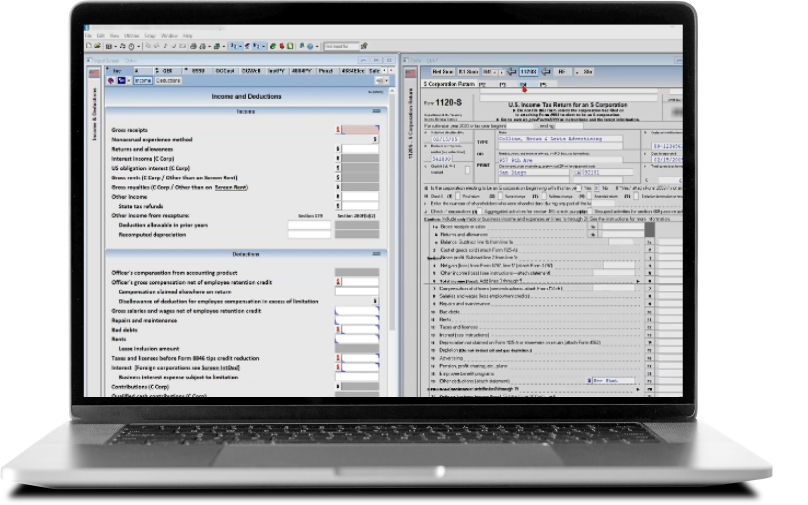For U.S. citizens living abroad or earning income from foreign sources, questions often arise on how the U.S. tax system applies to them and how they can ensure compliance while minimizing tax liability.
From understanding what foreign income is to navigating various tax forms and deductions, it is important for accountants to understand the ins and outs of U.S. tax on foreign income in order to help their clients ensure compliance and avoid penalties.
To support this effort, forward-thinking accounting firms are increasingly using tax preparation software and scan-and-populate solutions to tackle the challenges of foreign income reporting. With federal, state, and local tax programs that cut tax workflow time and increase productivity, accountants can automate the tax prep process and create a seamless client experience.
Let’s take a look at the basics of foreign income reporting and discuss how technology can ensure compliance and minimize tax liability.
Jump to ↓
| What is foreign income? |
| What is FEIE? |
| How to report foreign income |
| What is Form 1099-DIV? |
| Tax implications for owning property abroad |
| What is FATCA? |
| Helping clients with foreign income tax forms |
What is foreign income?
Foreign income is defined as any income earned from sources outside of the United States. It encompasses a wide range of financial activities, including but not limited to:
- Salaries and wages earned while working abroad
- Bonuses, allowances, and benefits provided by foreign employers
- Self-employment income derived from foreign businesses
- Interest earned from foreign bank accounts or bonds
- Dividends from foreign corporations
- Capital gains from the sale of foreign assets, such as real estate or stocks
- Earnings from renting out foreign properties
- Income generated by foreign businesses or partnerships in which you have an interest
- Any other income earned from foreign sources, such as royalties, alimony, or gambling winnings
What is foreign earned income?
Foreign earned income is defined as income earned through labor or services while living and working in a foreign country. This category typically includes salaries, wages, bonuses, and self-employment income received from foreign employment or business activities.
It’s crucial to distinguish foreign earned income from other types of foreign income, as the Foreign Earned Income Exclusion (FEIE), a valuable U.S. tax benefit, specifically applies to this category. Investment income, rental income, and passive income from foreign sources do not qualify for the FEIE. These types of income may be subject to different tax treatment.
What is FEIE?
The Foreign Earned Income Exclusion (FEIE) is a significant tax benefit provided by the IRS to U.S. citizens and residents who meet certain criteria. The FEIE allows eligible taxpayers to exclude a portion of their foreign earned income from U.S. taxation, potentially resulting in a reduced or zero U.S. tax liability on that income.
U.S. citizens and residents are generally required to report their worldwide income to the IRS. However, the U.S. tax system recognizes that U.S. individuals living abroad may face unique challenges and expenses. The FEIE is in place to alleviate some of the tax burden on expatriates.
To claim the FEIE, you must have foreign earned income, your tax home must be in a foreign country, and you must be one of the following:
- A U.S. citizen who is a bona fide resident of a foreign country or countries for an uninterrupted period that includes an entire tax year,
- A U.S. resident alien who is a citizen or national of a country with which the United States has an income tax treaty in effect and who is a bona fide resident of a foreign country or countries for an uninterrupted period that includes an entire tax year, or
- A U.S. citizen or a U.S. resident alien who is physically present in a foreign country or countries for at least 330 full days during any period of 12 consecutive months.
So, if you earned less than the most recent IRS threshold in foreign income during a tax year, you could potentially exclude your entire foreign earned income from U.S. taxation. The IRS Interactive Tax Assistant can help you determine whether income earned in a foreign country is eligible to be excluded from income reported on your U.S. federal income tax return (Form 1040).
Who needs to file Form 2555?
Form 2555 is the key form for claiming the Foreign Earned Income Exclusion (FEIE). To qualify, you must meet the following criteria:
- Foreign residence or physical presence test. You must pass either the bona fide residence test or the physical presence test. These tests generally mean that you have established a permanent residence in a foreign country and intend to live there indefinitely or you have been physically present in a foreign country for at least 330 full days during any 12-month period. The 330 days do not need to be consecutive.
- Foreign earned income. You must have earned income from employment or self-employment in a foreign country. Passive income, such as interest, dividends, and rental income, does not qualify for the FEIE.
- Tax home. You must have a tax home in a foreign country. Your tax home is typically the place where you conduct your regular business activities and maintain your primary economic interests.
Meeting these criteria allows you to exclude a specified amount of foreign earned income from your U.S. tax return.
Foreign Earned Income Exclusion vs. Foreign Tax Credit
The Foreign Earned Income Exclusion (FEIE) and the Foreign Tax Credit (FTC) are two distinct methods for mitigating the double taxation of foreign income.
As mentioned above, the FEIE allows you to exclude a specific amount of foreign earned income from your U.S. taxable income. This exclusion applies only to income earned through your labor or services while living and working in a foreign country.
The FTC, on the other hand, allows you to claim a credit on your U.S. tax return for foreign income taxes paid to a foreign government. This credit can offset your U.S. tax liability on foreign income that is not eligible for the FEIE, such as investment income or passive income.
To claim these, you’ll first have to qualify. If you do, you’ll then file additional tax forms (Form 2555 for the FEIE and Form 1116 for the FTC) and attach them to Form 1040. You report the FEIE on your Schedule 1, Line 8, and the
FTC on Schedule 3, Line 1.
How much foreign income is tax-free in the US?
The Foreign Earned Income Exclusion (FEIE) allows eligible individuals to exclude a portion of their foreign earned income from U.S. taxation. This exclusion can significantly reduce or eliminate the U.S. tax liability on foreign income. However, the specific amount of foreign income that is tax-free in the U.S. under the FEIE can change annually due to inflation adjustments.
For the tax year 2022 (the tax return filed in 2023), you may be eligible to exclude up to $112,000 of your foreign-earned income from your U.S. income taxes. For the tax year 2023 (the tax return filed in 2024), this amount increases to $120,000. For the tax year 2024 (the tax return filed in 2025), the foreign earned income exclusion amount is $126,500.
The FEIE applies specifically to foreign earned income, which generally includes income from employment or self-employment earned while living and working abroad. It does not apply to other types of foreign income, such as rental income, dividends, interest, or capital gains, which may be subject to different tax rules and may not be eligible for the FEIE.
Additionally, to qualify for the FEIE, you must meet certain criteria, including passing either the bona fide residence test or the physical presence test, having a tax home in a foreign country, and being a U.S. citizen or resident.
Tax laws can change, so be sure to check the latest FEIE limits and eligibility requirements for the tax year in question.
How to report foreign income
Reporting foreign income to the IRS is a critical aspect of tax compliance for U.S. citizens and residents. Depending on the type of income and your specific circumstances, you may use different forms and reporting methods.
One essential reporting requirement is the Foreign Bank Account Report (FBAR), also known as FinCEN Form 114. If the aggregate value of your foreign financial accounts, including bank accounts, exceeds $10,000 at any point during the tax year, you must file an FBAR to disclose these accounts. Failure to do so can result in severe penalties.
Additionally, taxpayers with significant foreign financial assets may need to file Form 8938, the Statement of Specified Foreign Financial Assets, as part of their federal income tax return. The reporting thresholds for Form 8938 vary based on factors such as filing status and residence.
How do you report foreign income without a W-2?
If you are working for a foreign employer and do not receive a W-2 form, reporting your foreign earned income can be a bit more complicated. In such cases, you should keep detailed records of your earnings, including pay stubs, contracts, and any other relevant documentation.
When it comes time to file your U.S. tax return, you will typically use Form 1040, the standard individual tax return form. You will report your foreign earned income on this form, specifying the source and amount of income. If you are eligible for the FEIE, you will also complete Form 2555.

Book
Your fastest research resource for any question on the complex and ever-changing area of international taxation.
Shop book ↗What is Form 1099-DIV?
Form 1099-DIV is used to report dividend income received from various sources, including foreign corporations. If you receive dividends from foreign companies, you should receive a Form 1099-DIV from the paying entity. This form will outline the amount of dividends paid to you and any foreign taxes withheld at the source.
To report foreign dividend income on your U.S. tax return, you will typically use Schedule B, which is an attachment to Form 1040. Schedule B requires you to list all your sources of interest and dividend income, including any foreign dividends. You will also need to report any foreign taxes paid on this income.
What are foreign qualified dividends?
Foreign qualified dividends are a specific type of dividend income received from foreign corporations that may qualify for lower tax rates in the United States. To be considered foreign qualified dividends, the following criteria must be met:
- The dividends must be paid by a foreign corporation that is eligible for the benefits of a U.S. tax treaty with the country in which the corporation is located.
- The dividends must not be effectively connected with a U.S. trade or business.
- You must meet the holding period requirements, which typically involve holding the stock for a specified period, such as 60 days during the 121-day period that begins 60 days before the ex-dividend date.
Foreign qualified dividends are generally subject to lower tax rates than ordinary income.
Tax implications for owning property abroad
Here are some key considerations regarding U.S. tax implications for owning property abroad:
- Rental income. If you earn rental income from foreign properties, you must report this income on your U.S. tax return. This includes both residential and commercial rental properties. The income is typically reported on Schedule E of Form 1040. It’s important to note that the income must be reported in U.S. dollars, so you may need to use the exchange rate applicable on the day you receive the income.
- Capital gains. When you sell a foreign property and realize a capital gain, you may be subject to U.S. capital gains tax. The tax treatment of capital gains on foreign property can vary based on factors such as the type of property, the holding period, and any applicable tax treaties between the U.S. and the foreign country where the property is located.
- Foreign mortgage interest. Interest paid on a mortgage for a foreign property may be deductible on your U.S. tax return, subject to certain limitations and conditions. The property must meet specific criteria, and the interest must be reported on Schedule A as an itemized deduction.
- Foreign property reporting. U.S. taxpayers who own foreign real estate may have additional reporting requirements. The Foreign Bank Account Report (FBAR) and Form 8938 (Statement of Specified Foreign Financial Assets) may apply depending on the value of the property and other foreign financial assets.
- Foreign property taxes. Taxes paid to foreign governments on your property may be eligible for a foreign tax credit on your U.S. tax return. This credit helps offset any U.S. tax liability on the same income.
- Estate tax implications. The value of foreign property may be included in your estate for U.S. estate tax purposes if it exceeds certain thresholds. Estate tax rules can be complex, so it’s crucial to consider how foreign property may impact your overall estate planning.
- Tax treaties. Review any tax treaties between the U.S. and the country where your foreign property is located. These treaties can affect the tax rates and treatment of income related to the property.
It’s worth noting that tax laws and regulations can change over time, so it’s essential to stay updated on current rules and requirements to ensure that you fulfill all reporting obligations while minimizing your tax liability. Proper tax planning and compliance are key to managing the tax implications associated with foreign property ownership.
Do U.S. citizens have to pay taxes on foreign property?
Owning property abroad, whether it’s real estate, bank accounts, or other assets, can have tax implications that U.S. citizens must be aware of and comply with. Various factors may come into play including the type of property, its use, and the income generated from it.
It’s important to note that U.S. citizens are generally required to report their worldwide income and assets to the Internal Revenue Service (IRS), even if they reside abroad. Failure to comply with these reporting requirements can result in penalties.
Given the complexities of international tax laws, tax professionals should consider an integrated tax research solution to keep pace with the latest information on foreign income and property in order to ensure full compliance and maximize potential deductions and credits for clients.
What is FATCA?
The Foreign Account Tax Compliance Act (FATCA) is a U.S. law that aims to combat tax evasion by requiring foreign financial institutions to report information about U.S. account holders to the IRS. FATCA also imposes reporting requirements on U.S. taxpayers with specified foreign financial assets.
If you have financial accounts or assets held in foreign institutions, you may need to report them to the IRS under FATCA. This reporting is in addition to the FBAR and Form 8938 requirements mentioned earlier.
Failure to comply with FATCA reporting obligations can result in penalties and may trigger additional scrutiny from the IRS. It’s crucial to stay informed about FATCA requirements and ensure reporting obligations are fulfilled.
Helping clients with foreign income tax forms
Navigating the complexities of U.S. tax on foreign income can be challenging for individual taxpayers and tax professionals alike.
Understanding and managing U.S. tax on foreign income is essential for supporting clients who are living abroad or earning income from foreign sources. While tax laws and regulations can be complex, the latest advances in tax software can boost accuracy and streamline reporting.
Here are some key considerations for accountants assisting clients with foreign income tax forms:
- Stay informed. The tax landscape is constantly evolving, with changes in tax laws, regulations, and reporting requirements. To keep pace with legislative changes, many tax professionals are turning to integrated tax research solutions that offer expert insight, analysis, and guidance into the full spectrum of tax topics.
- Prioritize documentation. Encourage clients to maintain comprehensive records of their foreign income, expenses, and financial transactions. These records are crucial for preparing accurate tax returns and supporting any deductions or exclusions claimed. Consider implementing scan-and-populate solutions that automate the tax preparation process and streamline documentation.
- Plan ahead. Help clients plan their finances in a tax-efficient manner, taking advantage of available deductions and exclusions. Consider implementing tax planning tools to help you advise clients on minimizing their tax liability while ensuring compliance with U.S. tax laws.
- Timely filing. Filing tax returns and related forms on time ensure your clients avoid penalties and interest charges. Consider optimizing your tax workflow with professional tax preparation software that includes a full line of federal, state, and local tax programs.
Tax software for US tax on foreign income
Tax software is a valuable tool for accountants serving clients with foreign income reporting requirements. It simplifies the often complex process of reporting foreign income, reduces the risk of errors, ensures compliance with tax laws, and ultimately helps accountants provide more efficient and accurate services to their clients.
Many tax software packages offer form-specific guidance, including instructions on which IRS forms to use when reporting foreign income. This helps accountants and clients ensure they are using the correct forms and filling them out accurately.
Tax software can calculate foreign tax credits, which can offset the U.S. tax liability on foreign income. This feature helps accountants ensure that clients maximize their available tax credits, reducing the risk of double taxation. In addition, tax software allows accountants to input financial data from various sources, including foreign income, in a streamlined manner.
Perhaps most importantly, tax software often receives real-time updates and alerts regarding changes in tax laws and regulations, including those related to foreign income reporting. This ensures that accountants and clients are aware of any changes that impact their tax obligations. It’s essential for accountants to select reputable tax software that meets their specific needs and stay updated on the latest tax regulations, especially when dealing with international tax matters.
If you’re an accountant looking to help your clients report on foreign income, SurePrep software can integrate with UltraTax CS, GoSystem Tax RS, CCH Axcess Tax, and Lacerte and can help you reduce manual data entry, ensure compliance, and minimize tax liability.
The AI-powered combination of 1040SCAN, SPbinder, and SafeSend One integrate with your existing tax software to automate each phase of the tax prep process. Together with Checkpoint Edge, you can be sure you are properly interpreting IRS tax legislation in an ever-changing landscape.

UltraTax CS
Professional tax preparation software to reduce your workflow time and increase your productivity
Learn more ↗






